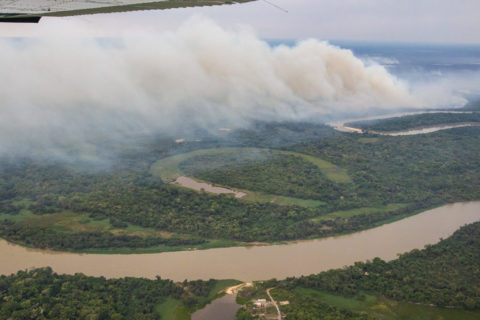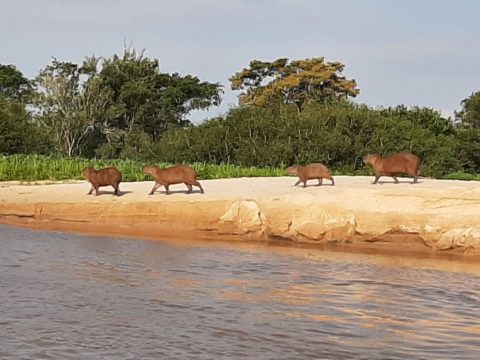
Wetlands International calls for collective action to halt and prevent further Pantanal fires
-
Community resilience
-
Corredor Azul
-
Rivers and lakes
Earlier this month Wetlands International’s leadership team gathered in the Brazilian Pantanal for its annual meeting. One of the key reasons to be there was to see the first fruits of work by our Latin American team and its partners to conserve the continent’s biggest wetland corridor stretching some 3,400km from the Brazilian Pantanal through the Iberá Marshes and the Paraná Delta in Argentina.
As we left the city of Cuiabá and drove to the 100,000 hectare SESC Pantanal Reserve, the largest private reserve in Brazil, managed by the national non-profit institution that aims to improve the health, education, culture, leisure and social assistance conditions in Brazil, we were struck by a lingering presence of smoke in the air.
Beyond the fires in the Amazon
Fires burned along stretches of road throughout the two-hour journey to this internationally renowned Ramsar and UNESCO world heritage site. Fires have been raging across the Pantanal since August in a situation just as serious as the Amazon [1]. Few, however, are talking about this tragedy.

The clearing of vegetation to make way for cattle grazing by burning is not unusual in the Pantanal. This year, however, fires have gotten out of control, with the region recording three times more outbreaks than in 2018. Fires have spread to four indigenous lands, with the most serious situation is in the Kadiwéu reserve, across the Porto Murtinho and Bodoquena municipalities.
Factors contributing to the fires
Several factors have contributed to the intensification of fires. While the region has this year experienced an unusually hotter and drier dry season, cuts to monitoring budgets have left these agencies with little resources to identify fires in real time. An already reduced fire brigade capacity and lack of emergency action from the government to mobilise state forces has meant controlling the fires has been extremely difficult. This, together with a fresh emphasis on the government’s new development policy to increase areas for agriculture and cattle raising, has resulted in a concerning situation.
According to SESC Pantanal Head of Research and Environment, Cristina Cuiabalia Neves, the fires in the region originate from the burning of areas for “opening land patches” for agriculture and pastures for livestock. Although it started later compared to other locations in the Pantanal, within the reserve, the fires took a large proportion, reaching over 10,000 hectares.
“It took 30 days of intense combat work with the team of fire-fighters, rangers and with the external support of the Fire Department and National Army. Unfortunately, we could not contain the burning of 10,000 hectares, but it was possible to save the other 100,000 hectares, safeguarding the majority of the protect unit. The dry season ends this week with the arrival of the first rains, but it has been certainly one of the most severe of the last ten years in the history of the Sesc Pantanal,” Ms. Cuiabalia Neves said.
But it’s not just in the rural Pantanal that the impact is felt. In neighbouring cities, flights have been cancelled, instances of respiratory illness have increased, and the vulnerable, young and old have been asked to stay indoors. The state of Mato Grosso do Sul last month declared emergency not just for its wild areas but for its cities.
Working with local communities to tackle the fires
So what can be done about the fires? Understanding the structure of land ownership structure and macro-habitats is key to the solutions required. While 5 per cent of the Pantanal is in conservation units [2], up to 90 per cent is privately owned, managed by ranchers, while indigenous territories account for a further 1.7 per cent. This means that conserving wildlife and sustainably managing the land depends heavily on local communities and farmers.
From our visit, we saw that long-standing traditional ranching practices can work in harmony with conserving the region’s habitats and fauna. Eco-tourism also brings job opportunities and wealth to the region. But we also saw examples of practices which took little heed of the natural values, resulting in land degradation as well as loss of biodiversity.
 Jane Madgwick, Chief Executive Officer, Wetlands International said: “The future of this vast, complex wetland, the biodiversity and the multitude of life-supporting roles it plays for people, is ultimately in the hands of local communities who live there or close by. SESC is making enormous and admirable efforts to raise awareness of the inter-connections between the nature, culture and economy of their reserve, but more support is needed.”
Jane Madgwick, Chief Executive Officer, Wetlands International said: “The future of this vast, complex wetland, the biodiversity and the multitude of life-supporting roles it plays for people, is ultimately in the hands of local communities who live there or close by. SESC is making enormous and admirable efforts to raise awareness of the inter-connections between the nature, culture and economy of their reserve, but more support is needed.”
“The fires that we just witnessed seem to signal a new, disturbing attitude towards the Pantanal. One which is blind to its special nature and sees it only as land. This unique and fragile region can easily be degraded or destroyed by fire and other bad practices, reducing not only its biodiversity but alongside this, its potential to support productive use in the long-term.”
An open letter calling for collective action
The “Campo Grande Declaration”, a statement by organisations in the region last month, described the situation as a “socio-environmental tragedy of gigantic proportions for nature and people”. It underlined the collective action needed – from government, local communities, ranchers and NGOs – to develop joint management plans and to encourage the adoption of long-term environmental restoration and fire prevention models.
It is in this spirit that the Wetlands International leadership team, with expertise in wetland management, preventing peatland fires and community-based disaster risk reduction, expresses its concern at the current situation facing the world’s largest wetlands. We call on government agencies and communities to work together to solve this situation.
Please read our open letter to the international community below calling for cooperation and the development of the joint management necessary for the sustainability of the region.
